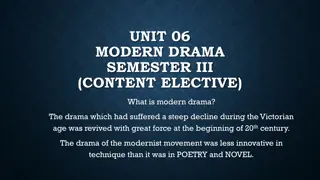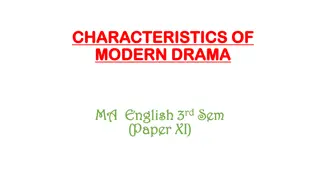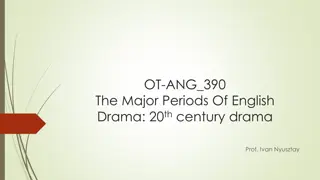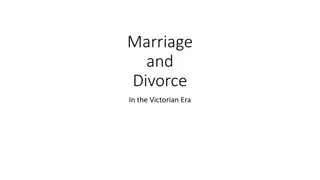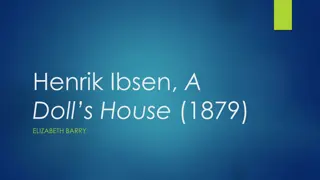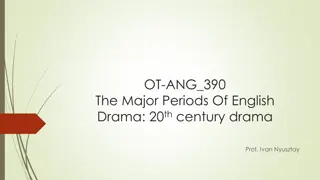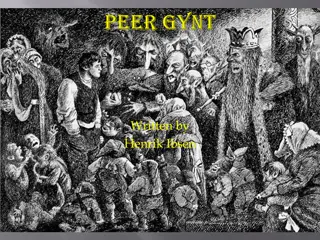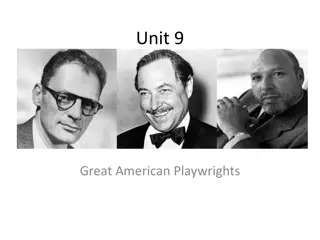Exploring Modern Drama: History and Characteristics
Modern drama, revived in the early 20th century after a decline in the Victorian age, encompasses realism, plays of ideas, romanticism, and poetic elements. English drama during the modernist period is categorized into phases marked by influential playwrights like Henrik Ibsen, G.B. Shaw, T.S. Eliot
0 views • 9 slides
Evolution of Modern Drama in the 20th Century: Characteristics and Trends
Modern drama in the 20th century experienced a revival and various trends. Realism was a significant quality where dramatists like Ibsen focused on portraying real problems of life. Problem plays emerged, addressing societal issues like marriage and justice. Modern drama shifted towards being a stag
1 views • 14 slides
Evolution of English Drama in the 20th Century: Shaw, Ibsen, and Modernist Theatre
The 20th century English drama witnessed significant shifts, from the realism and naturalism of George Bernard Shaw and Ibsen to the modernist theatre of Samuel Beckett, Tom Stoppard, and Harold Pinter. Themes of social change, rejection of traditional ideals, and a focus on human experiences domina
0 views • 39 slides
Marriage and Divorce in the Victorian Era
Victorian era marriages were often transactional, focusing on social status rather than love. Divorce was rare and only accepted on grounds of adultery. Women had limited rights within marriage, primarily tasked with childcare. The power dynamics in marriages like Torvald and Nora's in Ibsen's works
0 views • 6 slides
Exploring Henrik Ibsen's Iconic Play: Hedda Gabler
Discover the intricate plot of Henrik Ibsen's classic play, Hedda Gabler, as the protagonist Hedda seeks and grapples with control in her life, ultimately leading to tragic consequences. Set in a lavishly furnished drawing-room, the story unfolds through acts of creation and destruction, culminating
1 views • 24 slides
Exploring Themes in Henrik Ibsen's "A Doll's House" and Related Texts
The content delves into various themes from Henrik Ibsen's play "A Doll's House," along with related discussions on patriarchy, matriarchy, bourgeois audiences, and the essence of plays as unique worlds. Through analyses of space, time, character dynamics, and societal constructs, the exploration of
0 views • 19 slides
Embracing Nature: Insights from Norwegian Philosophies
Explore the deep connections between Norwegians and nature through concepts like friluftsliv (free air life) and deep ecology. Delve into the writings of figures like Arne Næss, King Olav X, and Henrik Ibsen, emphasizing the importance of prioritizing nature over economic interests. Discover how No
0 views • 7 slides
Exploring the Evolution of English Drama in the 20th Century
In the realm of English drama in the 20th century, significant periods such as Modern British Drama, Naturalism, and the works of George Bernard Shaw shaped the theatrical landscape. From the rejection of past ideals to the emergence of new social commentary, playwrights like Shaw and Ibsen challeng
0 views • 39 slides
Overview of Henrik Ibsen's Play "Peer Gynt
Peer Gynt, written by Henrik Ibsen, follows the adventurous life of its protagonist who travels through various places such as the mountains of Norway, the Land of the Trolls, Morocco, Egypt, and back to Norway. The story explores themes of lying, self-identity, and the consequences of seeking to be
0 views • 14 slides
Evolution of Great American Playwrights: Ibsen to Williams
Great American playwrights like Henrik Ibsen, Eugene O'Neill, Tennessee Williams, and Arthur Miller have made significant contributions to the world of theatre. They have explored timeless themes such as human behavior, society, and the struggle between illusion and reality. With regional connection
0 views • 14 slides
